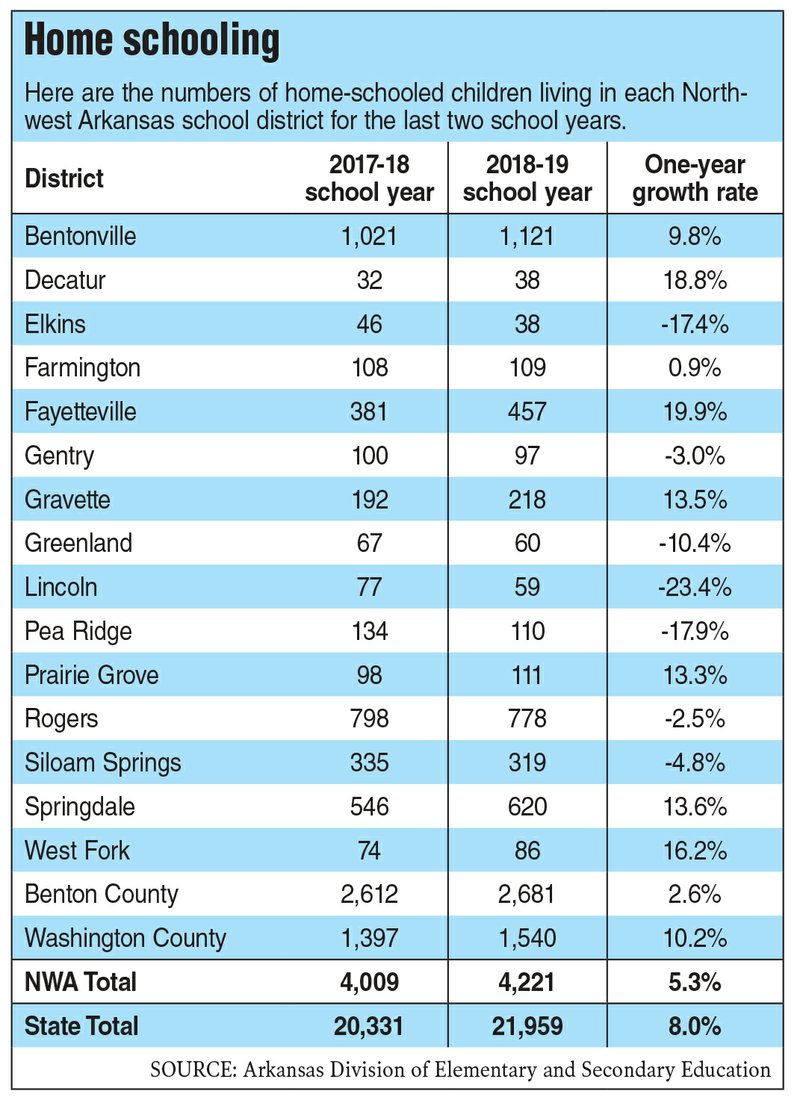The number of home-schooled children in Northwest Arkansas and the state continues to rise, far outpacing the percentage of growth in public-school enrollment.
The Division of Elementary and Secondary Education released data this month showing 21,959 home-schooled students in Arkansas during the 2018-19 school year. That's an 8% increase from 2017-18, the largest one-year percentage increase in 12 years.
Nationally
The number of home-schooled students in the United States more than doubled from 850,000 in 1999 to about 1.8 million in 2012, according to a 2016 report by the National Center for Education Statistics.
Source: Staff report
The home-schooling sector in Benton and Washington counties grew by 5.3%, from 4,009 students in 2017-18 to 4,221 in 2018-19. During the same period, public-school enrollment grew 1.6% in Northwest Arkansas; it fell 0.2% for the state as a whole.
The Bentonville School District, which already was leading the state with 1,021 home-schooled kids during the 2017-18 school year, had another 100 children in 2018-19.
"We respect the choice families have and we respect that parents will do what is best for their family," said Jennifer Morrow, the Bentonville district's director of secondary education.
Bentonville this school year launched a 100% online virtual school option for grades five through 12. Enrollment was at 115 as of Dec. 18 and is expected to exceed 150 in the second semester, Morrow said.
It's hard to say whether the virtual school is drawing many home-schooled kids back to the district. Of the students who expressed interest in the program last summer, about one-third were being home-schooled or were in a private school or another public school district, Morrow said.
The purpose of setting up the virtual school was not to attract home-schoolers, but to respond to the needs of families that prefer online education for whatever reason, she said.
The Rogers School District, with the second-largest number in Northwest Arkansas at 778, also set up a virtual school option this year.
Both Fayetteville and Springdale had unusually large spikes in 2018-19, with Fayetteville growing 20% to 457 students and Springdale growing 13.6% to 620 -- record highs for both districts.
Cassie Smith started the Social Homeschoolers Network in 2014 for Northwest Arkansas families looking for the kinds of field trips, activities and events schools offer. The organization has about 600 children among its members, she said.
The group this past fall launched an academy in Fayetteville, featuring academic and extracurricular classes ranging from high school biology to hip hop dance. It ended its first semester with more than 800 class registrations. The academy will add a location in Rogers in January, Smith said.
But the organization will not take over the brunt of the educational role in the lives of home-schooled kids, she said.
"We're offering a service for home-schoolers," Smith said.
Some local residents turn to home-schooling because of overcrowding in the public schools, Smith said.
The state has limits on class sizes, but school districts experiencing high growth sometimes put more students into a building than it's designed to accommodate.
"Some of it is overcrowding," Smith said. "Or (parents) don't agree with what's going on in the school district, or they just want to spend more time with their kids and be able to have more control over what their kids are learning."
State law requires every child ages 5 through 17 be enrolled in a public or private school unless a child is home-schooled. Parents who choose to home school are required to notify the superintendent of the school district in which they live. Meeting this annual requirement maintains legal home school status for the parents or guardians. Districts must submit a copy of each form to the state.
Arkansas' largest numbers of home-schooled students in 2018-19 were at the high school level. Tenth grade accounted for the most home-schooled students with 2,033 students, followed by 11th grade with 2,017 students and ninth grade with 1,914 students; however, 12th grade had the fewest home-schooled students with 1,426.
NW News on 12/29/2019
